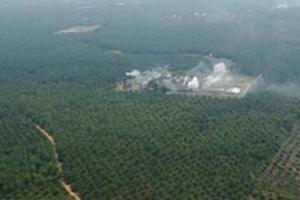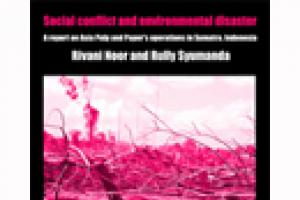Open letter to the European Parliament, the European Commission, the governments and citizens of the European Union
Sawit Watch. Bogor, 26 January 2007
Indonesia
Other information
26 January 2007
Other information
30 November 2006
Indonesia is one of the world’s most populous and rural countries, with a total population of 220 million people.
Other information
30 October 2006
Later this year, United Fiber Systems plans to open a new 700,000 tonnes a year wood chip mill at Alle-Alle on the island of Pulau Laut. The mill is the first step of UFS’ proposed pulp developments for Kalimantan. The wood chips will be exported to feed pulp and paper mills in China.
Other information
30 September 2006
Wherever industrial tree plantations are planted in the South, governments provide a range of subsidies to investors. In Indonesia, the government has handed out billions of dollars for plantation development. The plantation and pulp sectors have also received generous aid support. The World Bank and the Asian Development Bank funded studies in the 1980s. A range of export credit agencies helped finance the construction of pulp mills.
Publications
22 August 2006
By Rivani Noor and Rully Syumanda
Other information
1 August 2006
Extensive cultivation of oil palm and the resulting oil extraction have always been linked to repression. Plantation cultivation was originally established by colonial regimes. The rapid expansion of plantations in Asia following the Second World War was encouraged in connection with forest clearing and was used as a weapon in combating Malay rebels.
Other information
5 June 2006
On April 12, 2006, the report “The Kalimantan Border Oil Palm Mega-project” was released to show the plans of the Indonesian government to develop up to 3 million hectares of oil palm plantations on the island of Borneo, of which 2 million hectares along the Kalimantan-Malaysia border and 1 million hectares elsewhere --in areas still heavily forested and inhabited by indigenous communities--, to cater for international demand for cheap palm oil to meet the domestic and global demand for bio-fuel.
Other information
6 May 2006
In the last decade, financial institutions and investment banks have handed out more than US$40 billion for new pulp projects in the South. Analysts expect another US$54 billion to be invested in pulp mills in the South by 2015 much of it in Brazil, Uruguay, China, the Mekong Region and the Baltic States.
Bulletin articles
6 May 2006
In 2004, the Minister of Forestry, through Decree No. 101/Menhut-II/2004, issued a policy on accelerating pulpwood development to supply the pulp and paper industry. The policy received broad acceptance in the province of Jambi by PT Wira Karya Sakti (PT WKS), a forestry company subsdiary of the giant Sinar Mas Group (SMG).
Bulletin articles
7 April 2006
Another new FSC certificate of a major logging operation, this time in Indonesia, has got forest watchers scratching their heads.
Bulletin articles
7 March 2006
Earlier this year, a rare thing happened: West Papua hit the headlines. The news was the discovery of a new species of honeyeater bird, a "lost" bird of paradise, a nearly extinct tree kangaroo, 20 new species of frogs, four new butterflies and five new species of palms. The species were found during an expedition to the Foja Mountains organised by Conservation International and the Indonesian Institute of Sciences. "It's as close to the Garden of Eden as you're going to find on Earth," said Bruce Beehler, co-leader of the group.
Bulletin articles
8 February 2006
At the recent "Seafood Summit" conference event in Seattle organized by Seafood Choice Alliance (January 29-30, 2006), the WWF’s “Aquaculture Specialist”, Aaron A. McNevin, PhD, announced that WWF has formed the Sustainable Aquaculture Alliance, which is itself working towards some sort of farmed shrimp certification based upon Best Management Practices.


